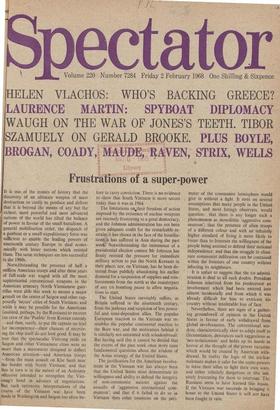Notwithstanding the presence of half a million American troops and
after three years of full-scale war waged with all the most sophisticated conventional weapons in the American armoury North Vietnamese guer- rillas were able this week to mount a major assault on the centre of Saigon and other sup- posedly 'secure' cities of South Vietnam; and while it may be possible for the Americans (assisted, perhaps, by the Russians) to recover the crew of the 'Pueblo' from Korean custody —and then, surely, to put the captain on trial for incompetence—their chances of recover- ing the ship itself do not look good. It may be true that the spectacular Vietcong raids on Saigon and other Vietnamese cities were no more than a manoeuvre designed to deflect American attention—and American troops —from the main assault on Khe Sanh near the border with North Vietnam; and that this in turn is in the nature of an Ardennes offensive intended to strengthen the Viet- cong's hand in advance of negotiations. But such optimistic interpretations of the course of the Vietnam war have been made in Washington and Saigon too often be- fore to carry conviction. There is no evidence to show that South Vietnam is more secure today than it was in 1964.
The limitations on.their freedom of action imposed by the existence of nuclear weapons are intensely frustrating to a great democracy, and the Johnson administration has not been given adequate credit for the remarkable re- straint it has shown in the face of the humilia- tions-lt has suffered in Asia during the past week: Notwithstanding the imminence of a presidential election contest Mr Johnson has firmly resisted the pressure for immediate military action to put the North Koreans in their place; nor, on Vietnam, has he been de- terred from publicly abandoning his earlier demand for a suspension of supplies and rein- forcements from the north as the counterpart of any us bombing pause to allow negotia- tions to start.
The United States inevitably suffers, as Britain suffered in the nineteenth century, from the jealousy and suspicion of less power- ful and semi-dependent allies. The popular European reaction to the Vietnam war re- sembles the popular continental reaction to the Boer war, and the motivation behind it is similarly not untainted with schadenfreude. But having said this it cannot be denied that the events of the past week once more raise fundamental questions about the wisdom of the Asian strategy of the United States.
The justification for the American involve- ment in the Vietnam war has always been that the United States must demonstrate its willingness and ability to defend the integrity of non-communist nations against the assaults of 'aggressive international com- munism': and that if it failed to do so in Vietnam then other countries on the peri-


































